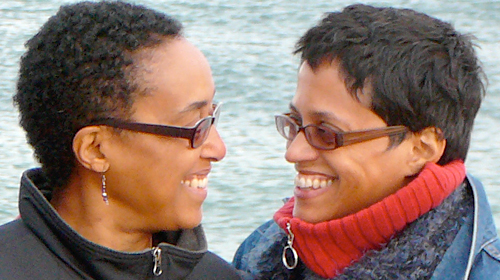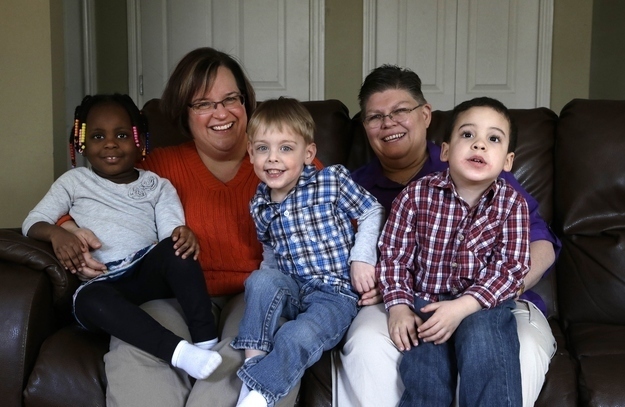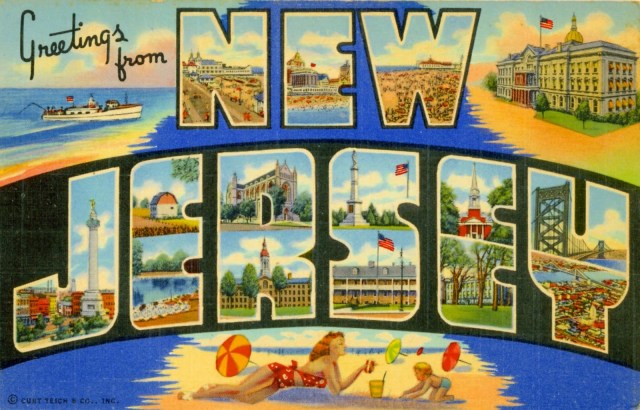“You know what this means, right?” I asked a friend while floating on my back in a pool last weekend. “All someone needs to do in a state that doesn’t have marriage equality is file their taxes next year and then sue. We’re gonna start to see bans drop like dominos.” I was maybe a little right, who knows, we’ll see, but also pretty wrong. We’re not going to have to wait until tax time. The United States Supreme Court’s decision to strike down the Defense of Marriage Act and to return the Prop 8 case to the 9th Circuit Court of Appeals are already starting to ripple through other marriage-related cases, making them easier to win or even just easier to exist. Happy Summer, everyone!

Gail and Angela, two Whitewood v Corbett plaintiffs, via ACLU
According to USA Today, Jon Davidson, the legal director of Lambda Legal, thinks that the language used in Justice Kennedy’s majority opinion can absolutely be used in other marriage equality cases around the country. Kennedy said that denying married same-sex couples federal benefits puts those marriage in a second-class. “It humiliates tens of thousands of children now being raised by same-sex couples.” We hear you, Justice Kennedy.
And Davidson was quoted as saying: “It’s stigmatizing and it’s harmful to people and particularly harmful to children when their parents’ relationship is treated as inferior by the government. Those points are points we will be making in all of our marriage cases.”
So, let’s take a look at those cases, shall we?
New Jersey
Lambda Legal’s deputy director and lead attorney in Jersey’s marriage equality fight Hayley Gorenberg released this statement hours after the DOMA ruling on June 26th:
The demise of DOMA Section 3 marks a turning point in how the federal government treats the relationships of married same-sex couples for federal programs. In New Jersey, where same-sex couples are in civil unions or may have been married in other states, but are barred from marriage at home, this is a game-changer.
When Lambda Legal filed our marriage equality lawsuit in New Jersey two years ago, we were prepared for a long legal battle that we have always believed will end with a decision in favor of equality. We know that there are many roads to justice, and our six plaintiff couples, their families and all same-sex couples in New Jersey need marriage equality as quickly as possible.
With this new legal landscape, New Jersey’s same-sex couples and their families need swift action, and we will now move ahead to secure that through our case.
Marriage Equality has been vetoed once by Governor Chris Christie. Though Lambda Legal has yet to announce their exact strategy in New Jersey, taking this DOMA language and challenging the law (and therefore bypassing Christie’s legislative body to go to a judicial one) is one way to gain Marriage Equality in New Jersey.
Pennsylvania, North Carolina and Virginia

Helena and Dara, two Whitewood v Corbett plaintiffs, via ACLU
Today, the ACLU and Lambda Legal launched three new marriage equality cases, all of which use the US v Windsor language as their justification. In Pennsylvania, ten long-term couples and one widow are going before the Third Circuit Court of Appeals in Whitewood v Corbett. If you’d like a good cry, here’s the video about the widow plaintiff, Maureen Hennessey:
North Carolina’s case, Fisher-Borne v Smith, the ACLU is adding marriage equality claims in light of the DOMA rulings to existing same-sex adoption claims. Six couples are involved here, and this will be heard by the Fourth Circuit Court of Appeals. In Virginia, the ACLU and Lambda Legal are challenging the same-sex marriage ban and will file the law suit in the next few weeks.
Michigan
In Bassett v Snyder, five state employees want same-sex partner benefits. But there’s currently no way to get them in Michigan because of a statute enacted in 2011. That statute says that in order for a public entity to provide benefits to the person you’re living with, you must be married to that person or they must be a dependent. There is no specification of sexual orientation in the statute. From SCOTUS Blog:
In granting a preliminary injunction to the plaintiffs, the judge concluded that the plaintiffs are likely to prevail on their claim that the statutory provision, Public Act 297, in effect establishes a form of discrimination on the basis of sexual orientation, when read in conjunction with the Michigan constitutional provision making same-sex couples ineligible to marry.
Then, relying upon the Supreme Court’s brand-new decision in United States v. Windsor, the district court found that the plaintiffs were likely to prevail under rational-basis review for another reason, as well — namely, that they would be able to demonstrate that enactment of the 2011 law was motivated by animus or ill will against gays and lesbians.
Another case in Michigan directly challenges the state’s same-sex marriage ban. Judge Bernard Friedman is letting the court proceed in hearing DeBoer v Snyder, despite state officials’ request to dismiss the lawsuit. The reason? US v Windsor:
On the other hand, plaintiffs are prepared to claim Windsor as their own; their briefs sure to be replete with references to the newly enthroned triumvirate of Romer v. Evans, 517 U.S. 620 (1996), Lawrence v. Texas, 539 U.S. 558 (2003) and now Windsor. And why shouldn’t they? The Supreme Court has just invalidated a federal statute on equal protection grounds because it “place[d] same-sex couples in an unstable position of being in a second-tier marriage.”
Plaintiffs are entitled to their day in court and they shall have it.

April DeBoer, second from left, sits with her adopted daughter Ryanne, 3, left, and Jayne Rowse, fourth from left, and her adopted sons Jacob, 3, middle, and Nolan, 4, right. Image by Paul Sancya / AP, via Buzzfeed
And in Indiana…
Where some states seem to be taking the DOMA ruling as precedent to hear cases and potentially change laws, Indiana seems to be… doubling down? At the beginning of this month, it became a level 6 felony for a same-sex couple to apply for a marriage license in Indiana due to the forms having space for a male applicant and female applicant. A couple can be punished with up to 18 months and a 10,000 dollar fine. According to my Indiana-residing sources, it used to be a class D felony which is, apparently, more severe than a level 6 felony, so… improvement? Hahahaha. Excuse me while I headdesk.
There are other states with rumblings and filed cases and soon-to-be-filed cases – statements about focusing on Hawaii, Illinois, Nevada, New Mexico – whether or not the DOMA ruling will be used in these cases remains to be seen.
Strategy
The ACLU has outlined their long-term strategies and their goal of gaining marriage equality in 20 states by the end of 2016. I was going to summarize them for y’all, but they’re already super clear and concise. From James Esseks, the litigation director for the ACLU LGBT cases, posted on The San Deigo Gay and Lesbian News:
- Lobbying in state legislatures. We’re working to pass freedom-to-marry laws in state legislatures, with a current focus on Hawaii, New Jersey, and Illinois. We have lobbyists in every state legislature and we have joined forces with our coalition partners to take advantage of the demise of DOMA to push for the passage of fair marriage laws.
- Organizing ballot campaigns. We need to repeal some of the 29 state constitutional amendments that exclude same-sex couples from marriage, building on our movement’s amazing successes at the ballot box last year in Maine, Maryland, and Washington. Our immediate goals are to put the freedom to marry into state constitutions in Oregon (in 2014) and Nevada (in 2016), and we are working with state and national partners to build these campaigns.
- Litigating in state court. We’re also working to persuade state courts that discriminatory marriage laws violate state constitutional protections. The ACLU is pursuing such cases pending in New Mexico (as co-counsel with the National Center for Lesbian Rights) and in Illinois (as co-counsel with Lambda Legal). Since these cases raise claims only under state law, and not federal law, the state supreme courts will have the last word and our opponents can’t try to get the U.S. Supreme Court to overturn any favorable ruling we may get.
- Working with right-of-center voices. Conservative voices are the next frontier in building public support for the freedom to marry, so the ACLU has hired top Republican strategists to bring right-of-center voices both to the state legislative and ballot campaigns and to the broader effort to generate greater public support for fair marriage laws.




Yep, I’m from Indiana. Their response to all the great strides we’ve made the past few weeks was basically the equivalent of if you’re in line at Panera Bread and you hear someone behind you talking about how much they want that last black and white cookie, so you order it just so they can’t have it because you don’t like the way they talk. It’s so petty, and one of the reasons I can never truly get super excited about marriage equality on a state-by-state basis, because if Indiana is left to make the decision instead of it being a federal law, then it’ll probably be us and Mississippi hanging out at the end, like 2050 and gay Hoosiers still can’t get married.
aw. mississippi. we’ll keep ya company.
I’m in Idaho. We have a constitutional ban on gay marriage. If I have to wait for us to figure it out I’m going to be very old and very, very sad.
That’s one of the many reasons I’m saving up to move.
I was thinking about Massachusetts, but I live in Michigan, so I might stick it out a while longer and see what happens… I honestly thought that it might never happen here. We don’t exactly have a socially liberal place to flee to in this state!
You can pretty much just swap Utah for Indiana in this, too. I’m super glad to be moving, except probably I’ll be headed for Texas and we know how awesome THAT has been lately >___>
I’ve read a lot of these news in piece-meal, so thanks for putting everything together here.
I will never, ever take for granted the fact that I will never have these burdens. I’m so lucky to be Canadian.
Yeah me too, Maureen. This is totally just allergies streaming down my face.
Well, Utah will be right there with y’all in MS and IN.
Don’t forget FLORIDA! Currently, the advocacy group Equality, Florida released a petition to change the language in the constitutional ban on marriage to gender-neutral language, which may put the question back on the ballot with enough support to pass it.
Also Also, the first person to sign the petition was, symbolically, former homophobic NBA star Tim Hardaway, so it’s getting a lot of press. Awesome.
I am from Indiana and all I can say is GET ME THE FUCK OUT OF HERE.
Sooo excited about Virginia. Moving from two states that have marriage equality to here was a bit of a bummer in that respect.